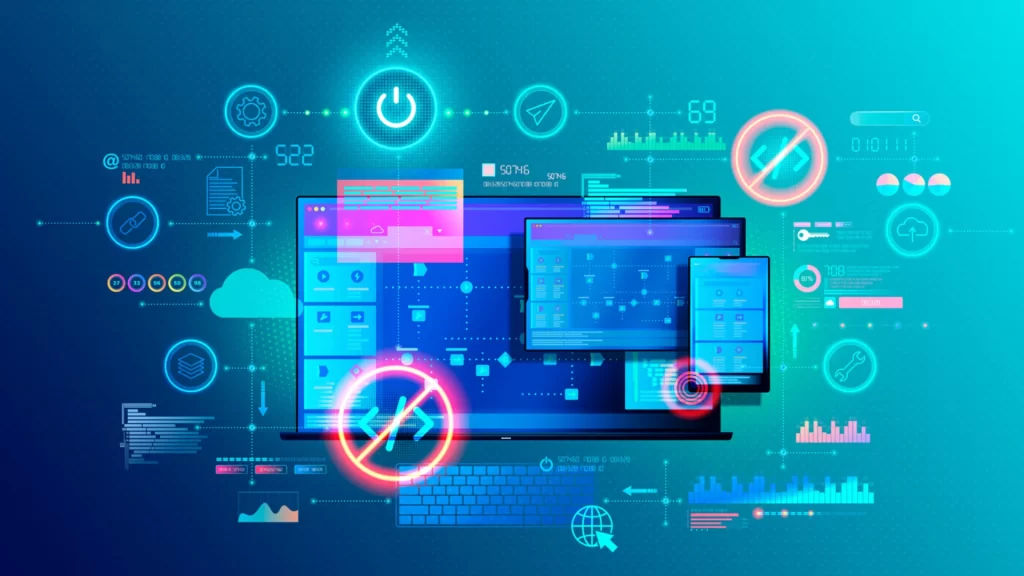Imagine building a website, designing graphics, analyzing data, and automating workflows… without writing a single line of code. The Best AI Tools for Digital Marketing come with user-friendly interfaces, drag-and-drop features, pre-built templates, generate AI to human text and step-by-step guides, making them perfect for business owners and marketers who want to focus on results, not technical details.
You don’t have to imagine it anymore.
That world is already here, and it’s getting easier every day.
If you’re a marketer, founder, freelancer, or side hustler, this post is for you. Let’s talk about the best free no-code AI tools that can help you work smarter, not harder.
How Are AI Tools Transforming Digital Marketing in 2025?
In 2025, marketers are increasingly relying on automation and AI to stay competitive, but not everyone has coding skills or technical teams. That’s where this guide comes in.
These no-code AI tools for marketers make it easy to automate tasks, generate content, optimize campaigns, and analyze data without writing a single line of code. Whether you’re running ads, building email campaigns, or creating blog content, these AI digital marketing tools help you grow smarter and faster.
Let’s dive into the top no-code AI tools transforming digital marketing in 2025.

What Are the Best AI Tools for Digital Marketing (No-Code Edition)?
No-code AI tools are platforms that allow anyone to use artificial intelligence without needing to write a single line of code. Think of them as AI tools made simple, where all the complicated programming is handled behind the scenes.
These tools come with user-friendly interfaces, drag-and-drop features, pre-built templates, generate AI to human text, and step-by-step guides, making them perfect for business owners and marketers who want to focus on results, not technical details.
Content Creation & Copywriting
| Tool Name | What It Does |
|---|---|
| ChatGPT | AI writing assistant for blog posts, emails, captions, and more |
| Copy.ai | Templates for product descriptions, CTAs, and marketing copy |
| Jasper AI | Creates polished, branded content for scaling campaigns |
| HubSpot AI Writer | Writes emails, landing pages, and ads directly from CRM |
| Notion AI | Helps brainstorm, write, and organize content in a workspace |
Visual Design & Media
| Tool Name | What It Does |
|---|---|
| Canva Magic Studio | Generates designs and branded visuals using AI |
| Adobe Express | Text-to-image, generative fill, and quick social post creation |
| Fotor AI | Enhances photos and removes backgrounds with one click |
| Pixlr | Browser-based editor with AI tools like auto-enhance and cutout |
| PhotoRoom | Edits and removes backgrounds for product images |
| Lumen5 | Turns blog posts into animated marketing videos |
| Deep Dream Generator | Creates dreamlike, surreal AI-generated images |
SEO & Analytics
| Tool Name | What It Does |
|---|---|
| Semrush (Free Tools) | Keyword research, backlink analysis, and site audits |
| Databox | Custom dashboards that visualize data from multiple sources |
| Coefficient | Real-time data insights in Google Sheets or Excel |
| SparkToro | Find where your audience is and what they care about |
| Screaming Frog | SEO crawler to audit and improve site structure |
| Surfer SEO | Analyzes and scores content for search optimization |
| Clearscope | Improves SEO content with keyword insights |
| Frase.io | Creates and optimizes SEO content using AI |
CRM, Messaging & Automation
| Tool Name | What It Does |
|---|---|
| HubSpot CRM | Email automation, workflows, CRM, and campaign management |
| Gupshup | Builds AI-powered messaging bots for multiple platforms |
| Zapier | Automates workflows between different apps (no code required) |
| Make (Integromat) | Visual builder for creating automated workflows |
| IFTTT | Sets custom “if this, then that” logic between apps |
| ActiveCampaign | Email and customer journey automation with AI assistance |
| Mailchimp | Email marketing with AI subject line optimization |
| AWeber | Email automation with an AI writing assistant |
| Adalo | No-code app builder ideal for internal tools or customer apps |
| asanAI | In-browser machine learning model builder for prototyping |
| Tray.io | Advanced automation and integration workflows using AI |
| Demand Sage | Custom AI-powered reports using HubSpot and Google Sheets |
| Monday.com | Project management with automation and AI-enhanced workflows |
AI Video & Audio Tools
| Tool Name | What It Does |
|---|---|
| Descript | Edits video/audio like text documents; includes transcription features |
| Wistia | Hosts videos and provides AI analytics for lead generation |
| Zoom AI Companion | Offers summaries, smart recaps, and meeting highlights |
| Amazon Video Generator | Creates short product videos using AI |
| Synthesia | Generates AI avatars that speak your script in various languages |
| Pictory AI | Converts long text into short social-ready video content |
| Runway ML | AI-powered video editing and generation tool |
Free Email Marketing AI Tools
| Tool Name | What It Does |
|---|---|
| HubSpot Free CRM | Offers email automation, smart content personalization, and basic AI-powered tools for free. |
| Mailchimp (Free Plan) | Includes AI-assisted subject lines, basic automation, and templates with up to 500 contacts free. |
| MailerLite | Drag-and-drop builder with AI writing assistance and up to 1,000 subscribers free. |
| Benchmark Email | Free plan includes AI-powered email creation and automation up to 500 contacts/month. |
| Sender.net | Free for up to 2,500 subscribers and 15,000 emails/month, includes smart segmentation and AI workflows. |
| AWeber Free | Includes AI Writing Assistant, email automation, and up to 500 subscribers on the free plan. |
How Do You Start Using These?
You don’t need to use all 30+ tools. Pick one from each category:
| Category | Tools |
|---|---|
| Content Generation | ChatGPT, Copy.ai, Jasper AI |
| Image Creation and Design | Canva AI, Adobe Firefly, Deep Dream Generator |
| Video Editing and Generation | Runway ML, Synthesia, Pictory AI, Lumen5 |
| Ad Optimization | Adzooma, Smartly.io, Pencil AI |
| Email Marketing and Automation | HubSpot AI, Mailchimp AI, ActiveCampaign, Zapier |
| SEO and Content Analysis | Surfer SEO, Clearscope, Frase.io, Descript |
| Analytics | Databox |
These tools help marketers streamline their processes without needing technical expertise, making AI more accessible than ever.
Start small. Get familiar. Then, stack more tools as needed.
Pro Tips to Get the Most From These Tools
Keep login info in one place (password manager)
Start with free tiers. Upgrade only when you hit a limit.
Document what works so your team can repeat it
Don’t forget to test, tweak, and measure
Marketing tech doesn’t need to be expensive or complicated anymore.
These no-code AI tools are ready to help you move faster.
What Are the Benefits of No-Code AI Tools in Digital Marketing?
For small businesses and startups, no-code AI tools offer a game-changing advantage. Here’s why they’re perfect for companies with limited budgets or small teams:
1. Are No-Code AI Tools More Affordable Than Traditional Tools?
Hiring data scientists or developers can cost thousands of dollars. In contrast, no-code AI tools for digital marketing are affordable and sometimes even free to start. Tools like ChatGPT and Canva AI offer freemium plans or low-cost subscriptions, making them accessible to marketers and small businesses alike.
2. Can No-Code AI Tools Save Time for Marketers?
Running a business is already time-consuming. No-code AI tools for marketers automate repetitive tasks, like sending personalized emails or analyzing customer data. Instead of spending hours manually segmenting your audience, AI tools in digital marketing like HubSpot AI can do it for you in seconds.
3. How Do No-Code AI Tools Help You Scale Marketing Efforts?
As your business grows, these tools grow with you. Whether you’re handling 100 customers or 10,000, No-code AI marketing tools can manage increasing workloads like campaign automation, data analysis, or lead nurturing without needing extra staff.
4. Can Non-Tech Teams Use No-Code AI Tools Easily?
You don’t need to be a tech expert to use no-code AI tools. With intuitive, drag-and-drop interfaces, even non-technical teams can create AI-driven content, design visuals, or automate email campaigns, saving both time and money.
How Do You Set Up a No-Code AI Marketing Campaign Step-by-Step?
If you’re new to using AI in marketing, don’t worry, setting up AI-driven campaigns with no-code tools is much easier than it sounds. Here’s a simple step-by-step guide to get started:
Step 1: Choose a No-Code AI Tool
The first step is to decide which AI tool best suits your needs. For example:
- If you want to create email campaigns, a tool like HubSpot AI is a great choice.
- For creating visuals or social media posts, Canva AI works wonders.
- Need help writing ad copy or blog content? Use ChatGPT & Jasper to generate and humanize AI Content quickly.
Focus on a specific task or problem you want to solve, then pick the right tool to get the job done.
Step 2: Integrate with Your Existing Systems
Once you’ve chosen a tool, connect it to your existing marketing systems. For example:
- Link your CRM (like Salesforce or HubSpot) to import your customer data.
- Connect your social media accounts to schedule and post content automatically.
- Sync with email platforms like Mailchimp to manage newsletters and personalized campaigns.
Most no-code AI tools come with simple integrations, so this step won’t take much time.
Step 3: Feed the Tool Data
AI tools work best when they have data to analyze. Upload relevant information, such as:
- A list of customer emails or contact information.
- Past campaign performance data to help the AI understand what works.
- Information about your audience, like demographics or buying behavior.
The more accurate your data, the better results you’ll get.
Step 4: Let the AI Recommend or Automate Actions
This is where the magic happens. Once your data is in place, the AI will analyze it and recommend actions or automate tasks. For example:
- Email Campaigns: HubSpot AI can suggest subject lines or draft personalized emails.
- Ad Campaigns: Tools like Adzooma can optimize your ad targeting to increase ROI.
- Content Creation: Use ChatGPT to quickly draft engaging social media posts or product descriptions.
Example:
Imagine you’re launching a new product and want to email your customers. You can use ChatGPT to write a high-converting email draft in minutes, feed it into HubSpot AI, and let the tool personalize the email for each recipient based on their behavior.
How Is AI Used in Digital Marketing for Marketers?
AI is revolutionizing digital marketing by helping marketers automate, analyze, and create faster and smarter than ever. Here’s how.
Content Creation
Creating high-quality content can be time-consuming, but no-code AI tools make it quick and easy.
- ChatGPT can generate engaging captions, blog posts, or product descriptions in seconds.
- Canva AI helps you design professional-looking visuals like social media posts, infographics, or flyers with minimal effort.
Customer Segmentation
AI tools can analyze your audience data and group customers based on their preferences and behaviors.
- Platforms like HubSpot AI can automatically segment your audience into groups like “loyal customers” or “first-time buyers.”
- This helps you send targeted offers that resonate with specific customer needs.
Email Personalization
Generic emails don’t work anymore. AI tools like Mailchimp with AI can personalize emails based on customer behavior, such as browsing history or past purchases; making your campaigns more relevant and effective.
Ad Optimization
Running ads can be expensive if they’re not optimized. No-code AI tools can help you:
- Create and test multiple ad versions quickly.
- Optimize targeting and bidding to ensure better returns on your ad spend.
Many businesses are successfully using no-code AI tools to enhance their marketing. For instance, companies like Coca-Cola utilize AI to analyze large amounts of customer data and create more targeted marketing campaigns. This approach allows them to identify consumer preferences and tailor their marketing strategies accordingly.
Watch: 9 AI Tools That Will Actually Automate Your Marketing in 2025
This video highlights powerful no-code AI tools that marketers can use to automate content creation, design, email campaigns, and more; without any coding knowledge. It’s a great visual complement to the tools explored in this blog.
Key Takeaways:
- Explore 9 AI tools designed to automate daily marketing and business tasks.
- Understand how tools like ChatGPT, Notion AI, and Descript can streamline content creation and productivity.
- See real examples of how marketers are using these tools to boost efficiency in 2025.
- Perfect for beginners looking to adopt AI without coding or technical setup.
Frequently Asked Questions
What Are the Best No-Code AI Tools for Digital Marketing?
Some of the best no-code AI tools include ChatGPT for content writing, Canva AI for design, HubSpot AI for automation, and Zapier for task automation. These tools are beginner-friendly and don’t require coding skills.
Can I Use AI Tools in Marketing Without Any Coding Knowledge?
Yes, no-code AI tools are built for marketers with no technical background. Platforms like Canva, ChatGPT, and Mailchimp offer drag-and-drop interfaces that anyone can use.
How Do No-Code AI Tools Help Digital Marketers Save Time?
No-code AI tools automate tasks like copywriting, customer segmentation, and email personalization. This reduces manual work and speeds up campaign execution.
Are No-Code AI Tools Free or Paid?
Many no-code AI tools offer free versions with limited features. ChatGPT, Canva, and HubSpot all have free plans suitable for beginners and small businesses.
Which No-Code AI Tool Should a Beginner Marketer Start With?
Start with Canva AI for design and ChatGPT for content. These tools are intuitive and offer great value for beginners without needing coding skills.
Can AI Be Used for Digital Marketing?
Yes, AI is widely used in digital marketing for automating tasks, personalizing content, analyzing data, and optimizing campaigns in real time.
Is AI Replacing Digital Marketing?
AI is not replacing digital marketing; it’s enhancing it. AI assists marketers by automating repetitive tasks and offering data insights, but human creativity is still essential.
What Type of AI Is Used in Marketing?
Common AI types in marketing include Natural Language Processing (NLP), machine learning, and predictive analytics used for chatbots, recommendation engines, and personalization.
Is AI Used in Ads?
Yes, AI is used to optimize ad targeting, A/B testing, budget allocation, and performance tracking across platforms like Google Ads and Meta Ads.
Is AI Marketing Worth It?
Absolutely. AI helps improve ROI by optimizing ads, automating content creation, and delivering personalized user experiences.
Can AI Write a Marketing Plan?
Yes, tools like ChatGPT and Jasper can draft outlines for marketing strategies, campaigns, and even competitor analysis. You should still refine the output with your unique insights.
How Does Amazon Use AI?
Amazon uses AI for product recommendations, dynamic pricing, voice search (Alexa), and personalized marketing campaigns to enhance customer experience.
How Is AI Used in Digital Media?
AI powers recommendation systems, auto-captioning, content tagging, and ad placement in digital media platforms like YouTube, Netflix, and Spotify.
Is There a Totally Free AI App/Tool?
Yes. Free AI tools like ChatGPT (free tier), Canva, and HubSpot CRM offer robust features without payment. Limitations may apply to usage or advanced functions.
Which Is the Number 1 AI App?
Currently, ChatGPT is one of the most popular and widely used AI tools due to its versatile capabilities in content creation, research, and customer support.
Which AI API Is Free?
OpenAI, Google AI, and Hugging Face all offer free APIs with limited tokens or usage, perfect for prototyping and small-scale projects.
Is Google AI Studio Free to Use?
Yes, Google AI Studio offers free access to developers and businesses to experiment with AI models. Paid options are available for advanced scaling.
Which Free AI Is Best?
ChatGPT, Canva AI, and Copy.ai are among the best free AI tools for marketers due to their ease of use and performance.
How to Use ChatGPT?
Visit chat.openai.com, sign up, and start chatting. You can ask it to write emails, ads, blog posts, or even brainstorm content ideas.
Is AI Chatbot Free?
Many platforms like ChatGPT, Tidio, and Crisp offer free chatbot tools with basic features. Premium plans unlock advanced options like automation and analytics.
Final Thoughts: Embracing No-Code AI in Your Marketing Strategy
No-code AI tools are revolutionizing how businesses approach marketing. They eliminate the technical barriers that once made AI inaccessible, allowing business owners and marketers to create impactful campaigns, save time, and reduce costs.
Whether you’re a small business owner or part of a startup, these tools are affordable, easy to use, and designed to grow with your business. By using tools like ChatGPT, Canva AI, or HubSpot AI, you can simplify your digital marketing efforts and compete in today’s fast-paced market.
Try one of the tools above or contact us to see how Intent Tale can help you implement AI into your campaigns, without a single line of code.
What will you build next?















